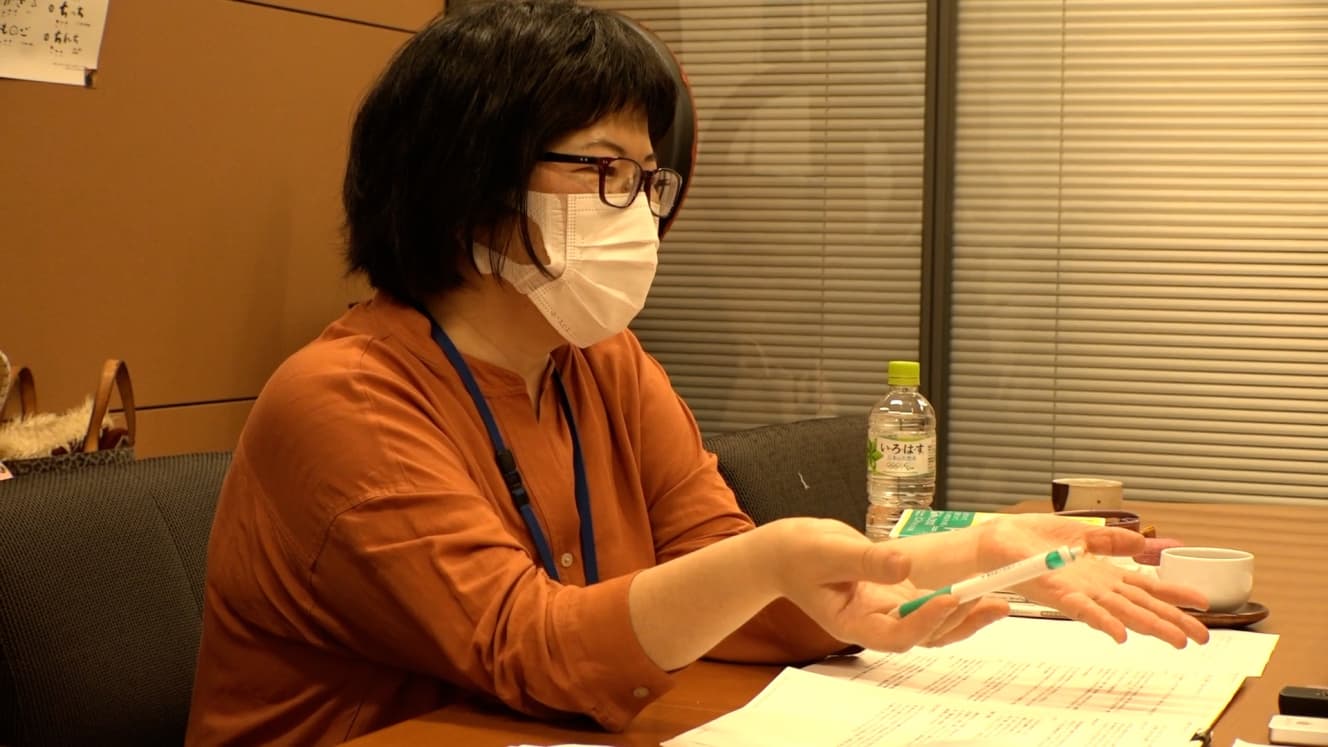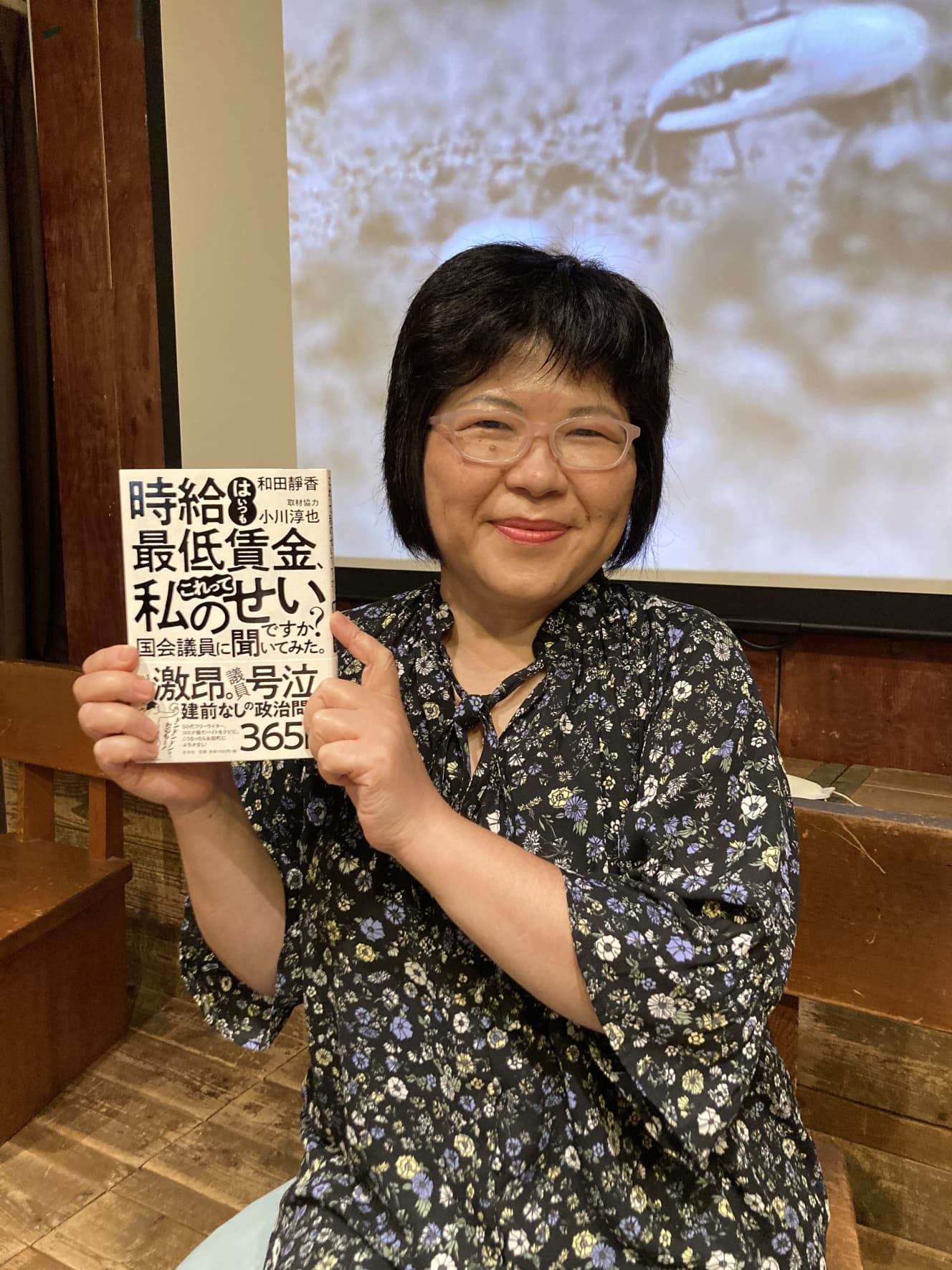Why a Political Dialogue Book by a Female Writer in Her 50s is Selling Well
I thought, ‘Well, everyone else is just as anxious as I am.
‘My hourly wage is always minimum wage, is this my fault? I asked a Diet member. The book is in its fourth printing and has sold 13,000 copies since its release.

In this book, sumo and music writer Wada Shizuka asked Ogawa Junya, a member of the House of Representatives and the subject of the documentary film “Why Can’t You Be Prime Minister?
The topics covered in the book range from population decline, taxes, social insurance premiums, immigration, the environment, energy, and nuclear power plants.
In fact, one of the most frequent comments from readers of the book was, “I read it in one sitting. (laughs) I think it’s amazing that people read this book in one sitting, because it’s not an easy story.
Also, for some reason, many people said, “I cried. At first, I thought, ‘Crying? Where? (laughs). (laughs) But when I read comments such as, ‘I realized that I have such anxious feelings inside me,’ I realized that reading this book helped me to verbalize my anxiety, and that I cried when I realized my anxiety, and I thought, ‘Well, everyone is anxious just like me.
This is what the author of the book, Shizuka Wada, has to say.

When you think of a book made with Diet members, you would expect it to be a “teacher-student” lecture or a Q&A session where the Diet members answer the questions of ordinary citizens, but this book is completely different.
The book begins with an exchange in which Mr. Ogawa carefully explains his questions to Mr. Wada, but there are no easy-to-understand “correct” answers. There are no easy “right” answers, so Wada, studying hard and diligently, tries his best to catch up with Ogawa and frankly express his bewildered feelings. Mr. Ogawa also listens to his thoughts and offers a new proposal. The balance of power is tense, and at times the two men’s opinions differ.
This is not a book about politics, but rather a tale of Mr. Wada’s adventures, and a drama about the encounter between Mr. Wada and Senator Ogawa and the bond that develops between them. It is a mysterious book full of energy that has no parallel and cannot be categorized into any genre.
“When I first wrote to Mr. Ogawa with the idea of making a book with him, I really had no plan. I just had a vague feeling that Ogawa’s words were good and that I wanted to hear and write about them, and I couldn’t even write a proposal.
With regard to the starting point of “my own feelings,” Wada adds.
He adds, “Before I went to Mr. Ogawa’s office, and even while I was there, my own worries, pains, and conflicts were very big (laughs). (laughs) So I thought it would be meaningless if I didn’t write about those worries, pains, and struggles.
But I didn’t even know what I didn’t know. So Mr. Ogawa said to me, ”
So we decided on a rough theme, such as “finances” or “labor problems,” sent the materials we had researched beforehand for sharing, and went to the interview (which Mr. Ogawa called a “death match”). At first, however, he still had no idea what kind of book it would be.
“In the beginning, I was so nervous that it was like a lecture where I just listened to Mr. Ogawa’s words in silence. But then I thought, ‘This is definitely boring even for a reader.
I was also troubled and anxious, and my desire to properly convey my thoughts became much stronger. But in order to convey my thoughts and feelings, I had to learn how to do it.
So, about the third time we met, I made a document on the statistical fraud issue. I don’t know what the point of it was, but I stayed up all night to make it (laughs). (laughs) Then, I realized that I had never understood statistics before because it was so difficult, but after I made the document, it coincided with the most difficult time in my life, and I was able to easily understand it.
Mr. Ogawa’s response to seeing the “ridiculous data” as Mr. Wada called it was, “Wow, you’re really good. Ogawa’s reaction after seeing the “ridiculous materials” was, “Wow, you’re really good.
Even though Japan is in such dire straits right now…
By the way, many people who watched “Why You” were surprised and impressed by the fact that there was such an earnest and sincere politician. At the same time, many people were despairing over the fact that such a politician could not win an election, and said, “All I can do is go to the polls. At the same time, there must have been more than a few people who were discouraged, thinking, “What kind of politics is it that such politicians can’t win elections?
Mr. Wada’s words put a big dent in this sense of despair.
“If you think that Mr. Ogawa alone will take care of it, you may feel such despair, but I think, ‘I’m definitely going to do it together with him.
(laughs) As Mr. Ogawa says, once everyone is aware of the problem and starts thinking, “What should we do? I believe that such awareness of the problems of each individual will be a great strength.
Don’t stop in despair, but even if you do stop, first understand that there is a problem. There is a big difference between going to the election knowing that there are solutions and proposals, and not going because you are in despair.
I still don’t know anything about politics, but I think I’ve been letting it go by saying “I don’t know. If I were to get a serious illness, I wouldn’t just leave it at “I don’t know”, would I? And yet, I think it’s different that even though Japan is in the midst of such an urgent medical condition, we still leave it untreated and don’t even try to treat it.
Mr. Wada’s greatness lies not only in his amount of study and perseverance. It is his ability to say, “I don’t know,” without hiding what he doesn’t know, to express in words what he doesn’t understand, and to involve the people around him.
“Mr. Ogawa would laugh and call me ‘thick-skinned. I thought so myself (laughs).
(laughs) In the first place, I didn’t have complete trust and confidence in Ogawa-san from the start. That’s why, at first, I even told my friend Tomoyuki Hoshino, the writer, that I didn’t know how much I could trust him (laughs). Of course, I was able to do that because of Mr. Ogawa’s open and flat personality.
This book was only possible for Wada, who worked part-time at a convenience store for minimum wage while writing, to write, and it also serves as a voice for the suffering of many people. But how should those who are unable to speak out or do not know how to speak out deal with politics?
“I think it’s important to raise your voice on social networking sites such as Twitter, and I think it’s also good to talk to people when they are giving speeches on the street.
But the hurdles are high. …… That’s why I think it’s a good idea to talk a little bit about politics with your family and friends in your daily life.
Due to the Corona disaster,
I am sure that there are not only Ogawa but also other Diet members who are sincere, talented, and willing to listen to the voices of the citizens, as well as members of the Tokyo Metropolitan Assembly, prefectural assembly, ward assembly, city assembly, and chief executives.
I don’t think there’s any shame in being spoiled at all.
Like Mr. Wada, each one of us needs to tell someone about our “pain” and “suffering” and to involve the people around us, which is the most necessary thing in this day and age.
“In my case, when I look around my house, I only have two pieces of furniture that I bought myself, and the TV, refrigerator, and washing machine were all given to me as second-hand items by my friends (laughs). (laughs) I’m always asking for help, but I don’t think there’s any shame in asking for help.
I think there is no shame in asking for help. When you receive something that was supposed to be thrown away, you don’t have to feel sorry for receiving it, and you don’t have to feel downhearted. I didn’t have any money to thank them, so I just wrote them a letter or a picture of a cat and that was it (laughs).
But whenever I was in trouble, someone would always ask me, “I’m throwing away a lot of clothes, do you want some? Do you want some of this? Do you want some?
As a matter of fact, Mr. Wada is also a person who assists the needy, as he co-authored a book titled “Running through Tokyo in the Wake of the Corona Disaster: A Diary of Support for the Needy under the Emergency Declaration” (Iwanami Shoten). That’s why these words based on his experience pierce my heart deeply and profoundly.
“People can’t really say, ‘Help me. I’ve heard so many stories of people who can’t accept the idea of ‘you can apply for welfare,’ because ‘no, that would be too much trouble.
There are times when it’s difficult to live and times when it’s hard, and it’s okay to be lenient in those times. That’s fine.
In fact, public assistance should come first, but we don’t have that now, and all we can do is “help ourselves,” which means we shouldn’t bother others. That’s why I think “mutual aid” is important. When in trouble, we should help each other. I think that’s how the world goes around.
“To say “I don’t understand” when you don’t understand, to tell someone about your pain and suffering, and to be able to say “help me” – this book surely contains many things that are necessary to survive in this day and age.
Wada Shizuka is a sumo wrestler and music writer. Born in Chiba Prefecture. She is the author of “Sekai no osumo-san” (The World’s Sumo Wrestler), “Korona kazai no tokyo wo kurikku: Jishin jishin shita no shimpo shien diary” (Running through Tokyo in the Corona Disaster: A Diary of Support for the Needy under the Declaration of Emergency) (both co-authored, Iwanami Shoten), and “Tokyo Rock Bar Monogatari” (Shinko Music). He likes cats, sponge cakes, and kitsune udon.
Interview and text: Wakako Tacko
Born in 1973. After working for a publishing company and an advertising production company, became a freelance writer. In addition to interviewing actors and actresses for weekly and monthly magazines, she writes drama columns for a variety of media. JUMP 9 no Tobira ga Openitoki" (both published by Earl's Publishing).

